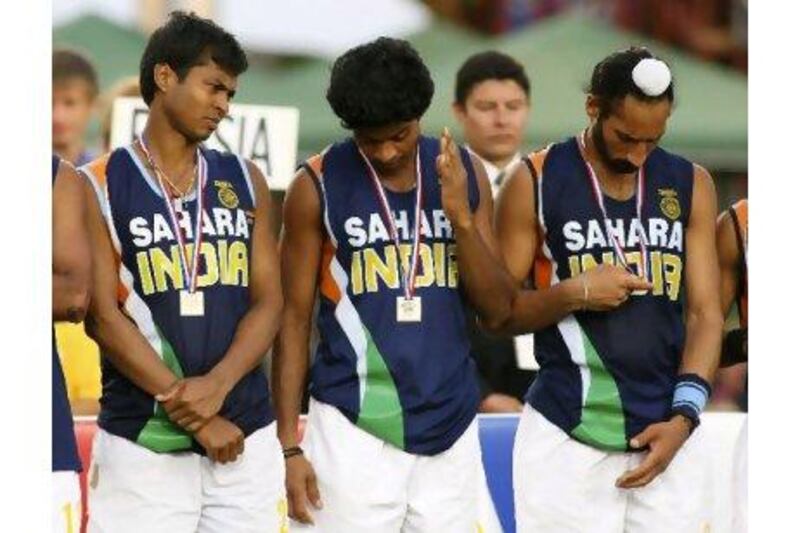There are few things as sad as the descent into oblivion of a sporting empire.
Ask children of today about Hungarian football, and the serious fans among them might mention Fulham's Zoltan Gera.
But how many would have heard of the Magical Magyars, 6-3 conquerors of England at Wembley in November 1953, and 7-1 winners in the return fixture months later? Ferenc Puskas, Sandor Kocsis, and Zoltan Czibor are now just names in fading print on yellowing paper.
After their shock defeat to West Germany in the World Cup final of 1954, Hungarian football went into a tailspin from which it has never recovered.
The West Indies cricket team of the late 1970s and 1980s were every bit as dominant as Hungary had been during their four-year, 31-match unbeaten streak.
Between the summer of 1976 and 1995, when they lost to Australia at home, the West Indies were beaten just twice in 35 series - by inexperience in India (the top players were playing for Kerry Packer in the World Series) and diabolical umpiring in New Zealand.
These days, they struggle to win even at home and their recent overseas record - not one series success in a major Test-playing nation in the new millennium - explains why they now languish in cricket's basement.
In both cases though, there were mitigating circumstances. In terms of both population and financial resources, Hungary and the Caribbean simply are not equipped to compete on even terms with the big boys of their sport.
The success that they enjoyed was largely because of a freakishly gifted generation of players that grew up together.
In that regard, no decline has been as shocking as that of Indian hockey. Winners of six consecutive Olympic gold medals between 1928 and 1956, they would add two more [1964 and 1980] before the roof caved in.
Lead poisoning may have contributed to the decline and fall of the Roman Empire. In Indian hockey's case, the switch to an artificial pitch from natural grass sounded the death-knell.
The physical demands on the players changed, as did the game's tempo. The mesmeric dribblers like Dhyan Chand and Hassan Sardar soon gave way to hefty penalty-corner specialists like Floris Jan Bovelander.
As the team's fortunes declined - India have not reached the last four at the Olympics since 1980 and did not even qualify for Beijing in 2008 - so too did public interest in the sport.
When Kapil Dev's cricket team won the World Cup at Lord's in 1983, the shift away from India's "national game" was complete.
Maladministration did not help. Kunwar Pal Singh Gill, a former policeman widely accused of human-rights abuse in his native Punjab, took charge of the Indian Hockey Federation (IHF) in 1994 and set about hiring and firing coaches as arbitrarily as Jesus Gil had during his heyday at Spanish football club Atletico Madrid.
Ric Charlesworth, the best coach in the world, was employed a few years ago, but as the senior side fumbled and flopped in the Olympic qualifying campaign, he was thousands of miles away working with the juniors.
Now, after the ill-fated Premier Hockey League, a fresh initiative to restore interest in the game has fallen foul of the International Hockey Federation (FIH), the game's governing body that suspended the IHF in 2008 and asked Hockey India to take over.
The IHF and Nimbus, a private broadcaster that also holds the telecast rights for Indian cricket, came up with World Series Hockey (WSH), a 10-team spectacle that was to give hockey aficionados their own Indian Premier League.
It was to be a 45-day event involving some of the best players from other nations, in addition to about 70 of India's finest. Now, the FIH has pulled the carpet from under the organisers' feet.
"FIH does not recognise the WSH," said a letter sent to the various national associations. "FIH notes that matches in the WSH may conflict with FIH major events, which may compromise an athlete's participation in their national team programme.
"Any player that participates in the WSH may render that player and NA ineligible to participate in any FIH tournament, including Olympic qualifying tournaments and the Olympic Games."
Hockey India and the FIH claim that they too are going to start a league that will be the "official" one. The IHF is recognised by the government's sports ministry and the courts, while Hockey India has the support of the Indian Olympic Association and the FIH.
And as the two tussle for what could be a substantial pot of gold, the prospects for Indian hockey remain as bleak as ever.





